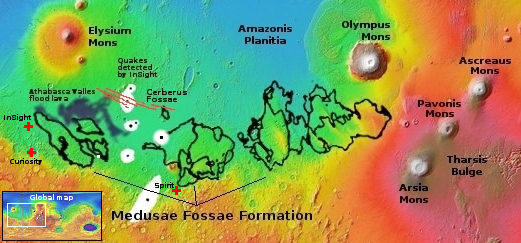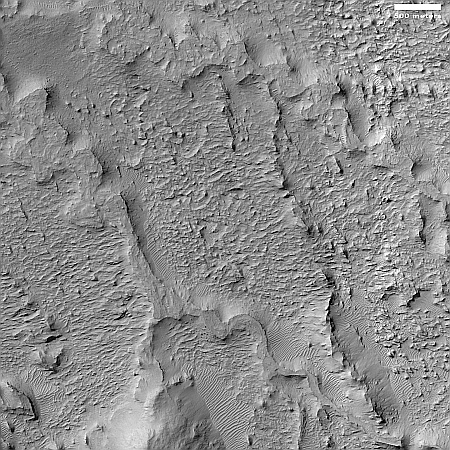More Martian inverted rivers?
Cool image time! The picture to the right, rotated, cropped, reduced, and sharpened to post here, was taken on June 23, 2023 by the high resolution camera on Mars Reconnaissance Orbiter (MRO). It shows what the scientists label “branching deposits,” two wiggling ridgelines with other ridges branching off from them.
What caused this? On Mars there are many such meandering ridges, all of which look like rivers that have positive relief, the opposite of what you would expect. The theory is that these weaving ridges were once canyons where either water or ice once flowed, compacting the streambed so that it was more dense than the surrounding terrain. When that terrain eroded away it left that streambed behind, as a raised meandering ridge.
That answer however might not apply here.

On the overview map to the right the white dot about 500 miles east of Curiosity marks this location, on the edge of the Medusae Fossae Formation, the largest deposit of volcanic ash on Mars and thought to be the source of most of the planet’s dust. The picture itself shows a lot of evidence of this ash, with ripple dune fields filling all the low spots between ridges.
It therefore appears that these ridges could very well be made of that volcanic ash, and thus might have formed from volcanic processes. For example, maybe we are looking at the bed of a lava tube or rill, and it was lava, not water or ice, that compacted the floor so that it resisted erosion.
Why the ridgetops are so flat remains unexplained, though this might be indicating the contact between an ash layer that was easily blown away and a more compacted lower layer.
Two other cool images near this spot show similar ridges (see here and here), both of which also had features that suggested that ash was part of their formation process.
On Christmas Eve 1968 three Americans became the first humans to visit another world. What they did to celebrate was unexpected and profound, and will be remembered throughout all human history. Genesis: the Story of Apollo 8, Robert Zimmerman's classic history of humanity's first journey to another world, tells that story, and it is now available as both an ebook and an audiobook, both with a foreword by Valerie Anders and a new introduction by Robert Zimmerman.
The ebook is available everywhere for $5.99 (before discount) at amazon, or direct from my ebook publisher, ebookit. If you buy it from ebookit you don't support the big tech companies and the author gets a bigger cut much sooner.
The audiobook is also available at all these vendors, and is also free with a 30-day trial membership to Audible.
"Not simply about one mission, [Genesis] is also the history of America's quest for the moon... Zimmerman has done a masterful job of tying disparate events together into a solid account of one of America's greatest human triumphs."--San Antonio Express-News
Cool image time! The picture to the right, rotated, cropped, reduced, and sharpened to post here, was taken on June 23, 2023 by the high resolution camera on Mars Reconnaissance Orbiter (MRO). It shows what the scientists label “branching deposits,” two wiggling ridgelines with other ridges branching off from them.
What caused this? On Mars there are many such meandering ridges, all of which look like rivers that have positive relief, the opposite of what you would expect. The theory is that these weaving ridges were once canyons where either water or ice once flowed, compacting the streambed so that it was more dense than the surrounding terrain. When that terrain eroded away it left that streambed behind, as a raised meandering ridge.
That answer however might not apply here.

On the overview map to the right the white dot about 500 miles east of Curiosity marks this location, on the edge of the Medusae Fossae Formation, the largest deposit of volcanic ash on Mars and thought to be the source of most of the planet’s dust. The picture itself shows a lot of evidence of this ash, with ripple dune fields filling all the low spots between ridges.
It therefore appears that these ridges could very well be made of that volcanic ash, and thus might have formed from volcanic processes. For example, maybe we are looking at the bed of a lava tube or rill, and it was lava, not water or ice, that compacted the floor so that it resisted erosion.
Why the ridgetops are so flat remains unexplained, though this might be indicating the contact between an ash layer that was easily blown away and a more compacted lower layer.
Two other cool images near this spot show similar ridges (see here and here), both of which also had features that suggested that ash was part of their formation process.
On Christmas Eve 1968 three Americans became the first humans to visit another world. What they did to celebrate was unexpected and profound, and will be remembered throughout all human history. Genesis: the Story of Apollo 8, Robert Zimmerman's classic history of humanity's first journey to another world, tells that story, and it is now available as both an ebook and an audiobook, both with a foreword by Valerie Anders and a new introduction by Robert Zimmerman.
The ebook is available everywhere for $5.99 (before discount) at amazon, or direct from my ebook publisher, ebookit. If you buy it from ebookit you don't support the big tech companies and the author gets a bigger cut much sooner.
The audiobook is also available at all these vendors, and is also free with a 30-day trial membership to Audible.
"Not simply about one mission, [Genesis] is also the history of America's quest for the moon... Zimmerman has done a masterful job of tying disparate events together into a solid account of one of America's greatest human triumphs."--San Antonio Express-News



Readers: the rules for commenting!
No registration is required. I welcome all opinions, even those that strongly criticize my commentary.
However, name-calling and obscenities will not be tolerated. First time offenders who are new to the site will be warned. Second time offenders or first time offenders who have been here awhile will be suspended for a week. After that, I will ban you. Period.
Note also that first time commenters as well as any comment with more than one link will be placed in moderation for my approval. Be patient, I will get to it.